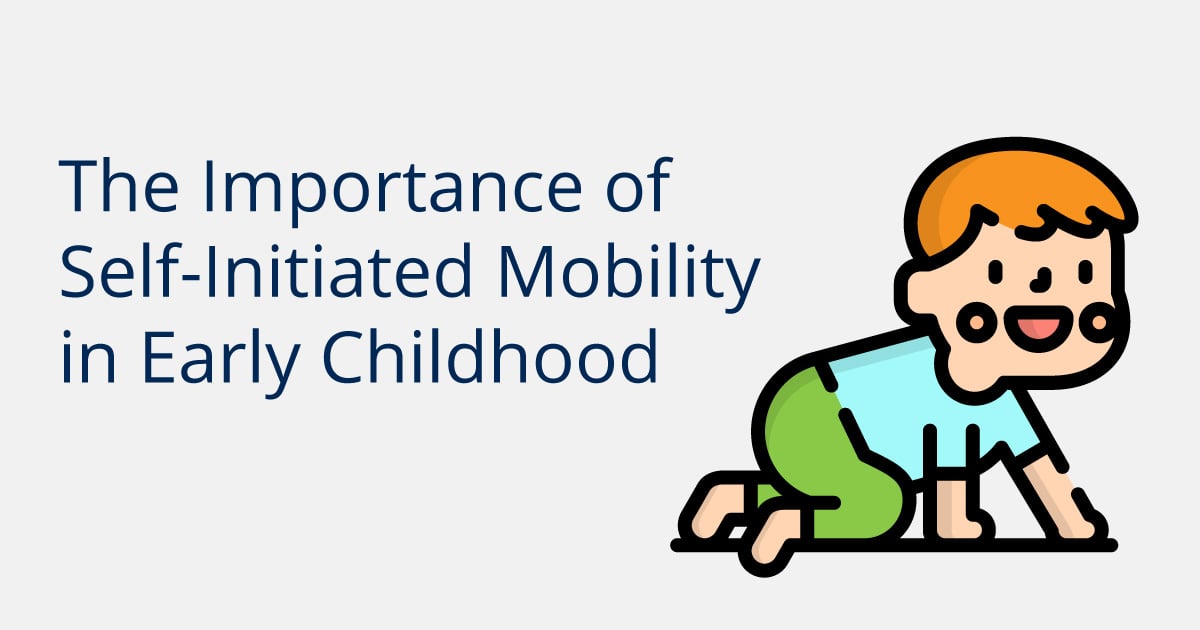This is the first blog in our series on early childhood developmental milestones related to mobility. See part 2, part 3, part 4, part 5, part 6, part 7, part 8, part 9, part 10, part 11, and part 12. Learn more about the Explorer Mini here.
Young children are their own change agents. When they want something, they find a way to direct others to provide it for them. They may cry, smile, pout or grimace to cause a reaction to their action. This is a continual, increasingly complex way of making their place on earth their very own. Children learn through exploration. If a child is unable to self-direct their exploration and must rely on others to bring items to them, it is not of their choice.
Children need choice to learn to make decisions, initiate actions, and learn reactions.
An infant begins exploring their environment the second they are born. They look around to find the smiling face, put their fingers in their mouth and wiggle any body part they want. If a child is unable to move, they do not find their environment, they may lose their inherent curiosity. A quick review of development demonstrates how children come to move independently. Around two months of age they lie on their tummy, hold their head up and start to fix their eyes on objects nearby. Once they begin to sit up at 6 months, they stretch out with their hands to find objects within their reach. When successful at finding and manipulating items in reach they begin noticing items beyond their reach and because their arms are not needed to sit up, they reach beyond themselves until they fall on outstretched arms and realize “oh, if I just wiggle the right way I can get that toy." This is the beginning of what later becomes crawling which helps to strengthen an infant’s arms and legs to prepare for standing and eventual walking. 
But what happens when a young child does not sit unsupported due to a development delay or medical condition that limits their ability?
The typical developmental sequence is altered. Their ability to change their environment, control the objects they want, forage into spaces is halted. What if we could change that? What if we could provide children with a substitute, whether it’s temporary or long term? Wouldn’t it be great if we could provide a device that offers the support a child needs to maintain their change agent status? Permobil recognizes the positive impact that creating a mobility solution can have on young children.
The first two years are crucial in development.
The ability to explore the environment ushers in a cascading array of cognitive, social, emotional and spatial skills that concurrently provide tremendous opportunities for growth. Without self-initiated mobility children are not the agent of change but rather the consequence of someone else’s decision.
Icons made by Freepik from www.flaticon.com
 Dr Teresa Plummer, PhD, OTR/L, ATP, CEAS, CAPS
Dr Teresa Plummer, PhD, OTR/L, ATP, CEAS, CAPS
Associate Professor in the School of Occupational Therapy at Belmont University
Dr Teresa Plummer, PhD, OTR/L, ATP, CEAS, CAPS is an Associate Professor in the School of Occupational Therapy at Belmont University in Nashville, TN. She has over 40 yrs of OT experience and 20 in the area of Assistive Technology. She is a member of the International Society of Wheelchair Providers, and the Clinicians Task Force. She is a reviewer for American Journal of OT and guest reviewer for many other journals. She has presented internationally, nationally and regionally particularly in the area of pediatric power mobility. She has authored journal articles and textbook chapters in the area of OT and pediatric mobility and access.
 Stacey Mullis, OTR/ATP
Stacey Mullis, OTR/ATP
Director of Clinical Marketing
Stacey serves as Director of Clinical Marketing for Permobil. A practicing OTR for over 20 years, she has experience in school-based pediatrics, inpatient rehabilitation, long term care, and home health. With her interest in wheelchair seating and positioning, Stacey engaged the challenges of providing appropriate seating in various clinical settings. She now uses this experience to develop programs and resources to educate clinicians on the principles of seating and wheeled mobility. She is passionate about equipping clinicians and through her previous role as Director of Clinical Education with Comfort Company and now with Permobil she has taught nationally and internationally to increase therapist capacity in this specialty area. Mullis graduated from Western University in London, Ontario, Canada with a BA Linguistics and BSc Occupational Therapy. She is a member of the NCOTA, CTF Executive Board, NRRTs, RESNA, and AOTA.

